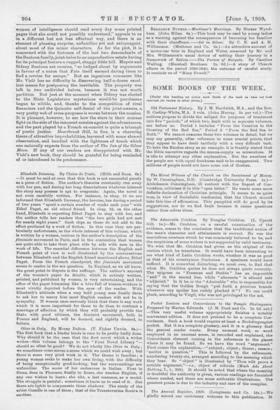Elisabeth Davenay. By Claire do Pratz. (Mills and Boon. 6s.)
—It must be said at once that this book is not successful purely as a piece of fiction. The author's theories constantly run away with her pen, and during her long dissertations whatever interest the story may possess is apt to evaporate. Again, the novel is not even carefully written. For instance, in chap. 15 we are informed that Elisabeth Davenay, the heroine, has during a period of two years "spent a certain number of weeks each year" with Ethel Paget, an old school friend. In chap. 19, on the other hand, Elisabeth is expecting Ethel Paget to stay with her, and the author tells her renders that "the two girls had not mot fer nearly eight years." Such slips as these do not add to the effect produced by a work of fiction. In this case they are par- ticularly unfortunate, as the whole interest of this volume, which is written by a woman, centres in the author's description of the feminists movement in Paris, and in the contention that women are quite able to take their place side by side with men in the work of life. The essential difference between the English and French point of view is well illustrated by the conversations between Elisabeth and the English friend mentioned above. Ethel Paget. From the French standpoint, the feminists movement seems to centre in the sex question. In England, as we all know, the great point in dispute is the suffrage. The author's account of the woman's paper La Revolts, which is entirely written, printed, and published by women, is very entertaining, and the office of the paper humming like a hive full of women-workers is most vividly depicted before the eyes of the reader. With Elisaboth's attitude when a very bold young man finally dares to ask her to marry him most English readers will not be in sympathy. If women once seriously think that there is any work which it is more important for thorn to do than to contract a marriage of affection by which they will probably provide the State with good citizens, the feminist movement, both in France and England, will be doomed, and rightly doomed, to failure.










































 Previous page
Previous page